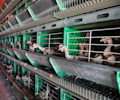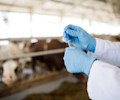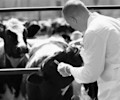US food giants fail to act to combat the threat
FAIRR’s Responding to Resistance report examines the progress of the network’s engagement with some of the world’s leading food companies. Among other findings, FAIRR benchmarks corporate progress on antibiotics management against peer companies.
Out of 20 global food giants, the only two companies that did not respond to the investor request for information were Florida-based Bloomin’ Brands, owners of the popular Outback Steakhouse chain; and Dallas-based Brinker International, owners of Chili’s Grill & Bar.
Bloomin’ Brands has no policy currently in place to manage or reduce their use of antibiotics. Brinker International has said they adhere to FDA’s guidance on antibiotics stewardship. However, the FDA’s framework is both voluntary and far from robust enough to be effective. For example, it discourages the use of medically important antibiotics as a growth promoter, but does not attempt to restrict the routine use of such antibiotics on healthy animals – one of the key drivers of resistance.
Identifying leaders
The report also brings to life what corporate leadership on this issue looks like. For example:
Four UK companies – The Restaurant Group, Greene King, Whitbread and Domino’s Pizza Group UK have all committed to phase out the routine use of antibiotics on all livestock species.
The Cheesecake Factory has a comprehensive ‘no antibiotics’ policy in place.
Last week also saw the publication of best practice guidance for food companies. This policy is endorsed by expert groups such as The Natural Resource Defence Council, the Antibiotic Resistance Action Center at the George Washington University and the Alliance to Save Our Antibiotics. It provides a framework for both food producers and purchasers to apply to their production and procurement processes.
Together with the World Health Organization’s announcement earlier this month, which calls for the end of non-therapeutic use of antibiotics by farmers and food producers, the best practice framework strengthens the momentum behind the fight to keep antibiotics working – and gives corporates and investors the tools to take action.
The time to act is now
As it becomes clear what appropriate stewardship of antibiotics looks like, companies have no excuse not to address this issue.
Already, 700,000 people die every year from antibiotic resistant infections. Without urgent action, we risk losing one of the most important weapons of modern medicine. Leading food giants must respond.
FAIRR insights are written by FAIRR team members and occasionally co-authored with guest contributors. The authors write in their individual capacity and do not necessarily represent the FAIRR view.











